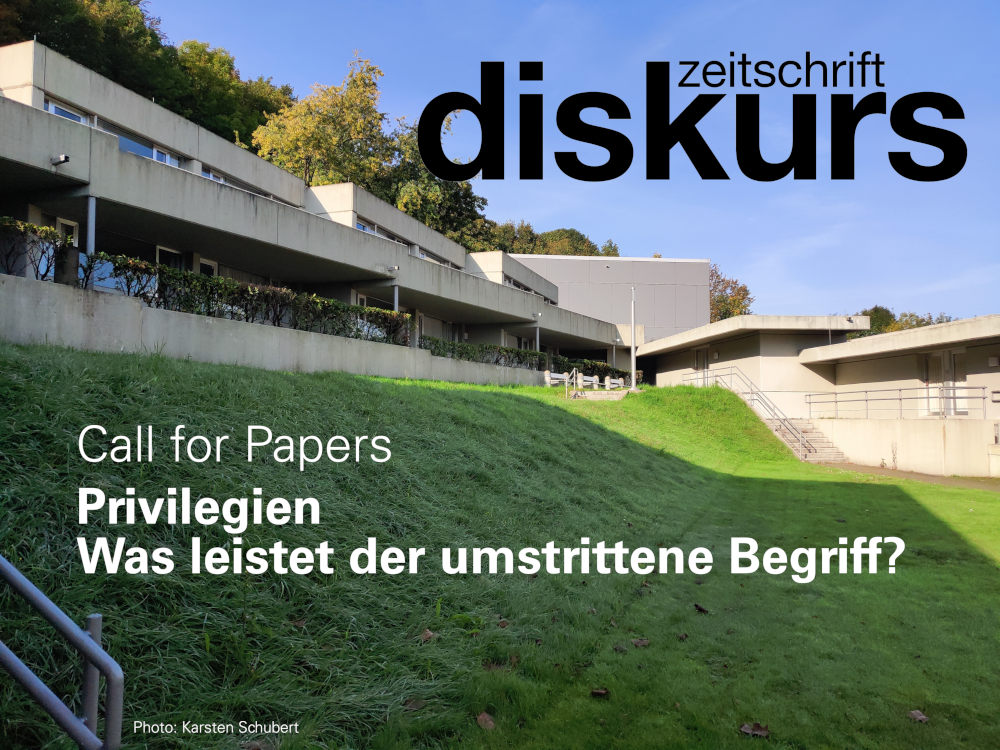New CfP of the journal diskurs: Privileges - How useful is the contested concept?

automatically translated
The new CfP of the journal diskurs on the subject of privileges is out!
The coronavirus pandemic with its heated protests against restrictions on public life; the wave of global anti-racist protests against racist police violence following the assassination of George Floyd; and the struggle of youth for policies that take climate change seriously: These are just three examples of contemporary political struggles in which privilege is at the center. The privilege of living in a Western industrialized nation with a functioning health care system, and the very act of wearing a mask can be perceived as a restriction of freedom. The privilege to be white and to be exposed to a low risk of becoming a victim of racist police violence. Or also the privilege of being old and not having to be interested in a climate-friendly future. The concept of privilege is also used to analyze social and economic conditions, for example when the privilege of the home office is mentioned in connection with professions that are not “systemically relevant”, the privilege of wealth or the privilege of being male.
The concept of privilege aims to make visible that social power relations always include asymmetries between different positions, for example, between the privileged and the discriminated. This is often ignored when only the discriminated are mentioned. These then look like the special case, while the profiteers of the relations are not visible as such. Thus, the question of the hegemonic perspective of “normality” is at stake, which allows the privileged not to see themselves as part of the problem and to ward it off, as it were.
While “check your privilege” - i.e., the call to reflect on one’s own privileges - has therefore become a central element of critical debate in many places, the conservative feuilleton and liberal political philosophy have found a new archenemy in the criticism of privilege - in a series of “identity politics” and “political correctness”. While these debates have been heated recently, there are surprisingly few theoretical, philosophical and social science debates on the concept of privilege, the critique of privilege and the political struggles associated with it. The journal diskurs will therefore devote the next issue to the topic of privileges and ask: What does the controversial term do?
We welcome submissions on the following problems and questions, but are also open to submissions that address other aspects of the discussion on privileges.
- Epistemic: How can “the privileged” and “the subalternized”/“the discriminated” be distinguished at all? From which political or scientific position can this distinction be made? Hegemonic theory, feminist and post- or decolonial traditions offer fruitful approaches here; however, there are hardly any general and systematic treatments of these central questions.
- Empirically: What can be learned from the social struggles for the critique of privilege? What forms of criticism of privilege are practiced, for example, in social movements and how can these forms be retranslated into theory? Or also: What forms of being privileged or subalternized offer the basis for political struggles at all?
- Normativity and consequences: What exactly should follow from the critique of privilege? Should the privileged give up privileges, or should the non-privileged be “empowered”? Or is this opposition itself problematic, although or precisely because it seems to be implied by the vocabulary of privileges?
- History of ideas and theory: How can the concept be located and pursued in theoretical debates? Where exactly does it come from? To which terms is it related? And what role does it play in critical theories, such as intersectionality, feminist or anti-racist theory formation? And how does it relate to the critique of capitalism? Is it a dilution or a specification when property is described as a privilege?
- Counter Voices: The outrage of the liberals, conservatives and the New Right is great in the face of the left criticism of privilege. How does this critique of the critique of privilege work? Can it profitably describe itself in this vocabulary, as the defense of privilege? How is the contemporary historical and theoretical-political genesis of the attack on left criticism to be seen? And how does it relate to other fighting concepts such as “identity politics” and “political correctness”?
diskurs brings together innovative social science works that analyze political and social hegemony, power relations, and practices in an original and critical way. Works from political theory and social theory are just as welcome as empirical analyses. Since 2015, discours has been published once a year in its current form with a thematic focus and consecutive numbering.
All articles submitted to us undergo a careful process of editorial and external review (double blind peer review). All published articles are available online and open access. Publications are indexed and provided with a DOI via the publication server of the University of Duisburg-Essen (DuEPublico). Thus, they can be found via all common databases.
Contributions can be submitted immediately until April 31, 2021. To submit your contribution, please use the submission function on our homepage www.diskurs-zeitschrift.de. If you have any problems or questions, please contact: redaktion@diskurs-zeitschrift.de. Submissions should be no longer than 50,000 characters. For more information on formatting, please visit http://diskurs-zeitschrift.de/Hinweise-fuer-Autorinnen-diskurs.pdf.
Link to the call on the diskurs website
https://ojs.ub.uni-due.de/diskurs/announcement/view/6
More about the journal diskurs
https://www.diskurs-zeitschrift.de
Related Posts
- New Journal Article: Two Concepts of Academic Freedom. The Relation Between Academia and Politics, 13. September 2023
- New publication: The crux of the nuclear family, 23. December 2020
- Podcast with Campusgrün Freiburg: 'Political Correctness' as Privilege Criticism, 25. April 2020
- ‘Political Correctness’ as Slave Morality? Towards a Political Theory of Privilege Critique, 9. March 2020
- New CfP of the journal Diskurs: Feelings of Resistance?, 28. August 2019